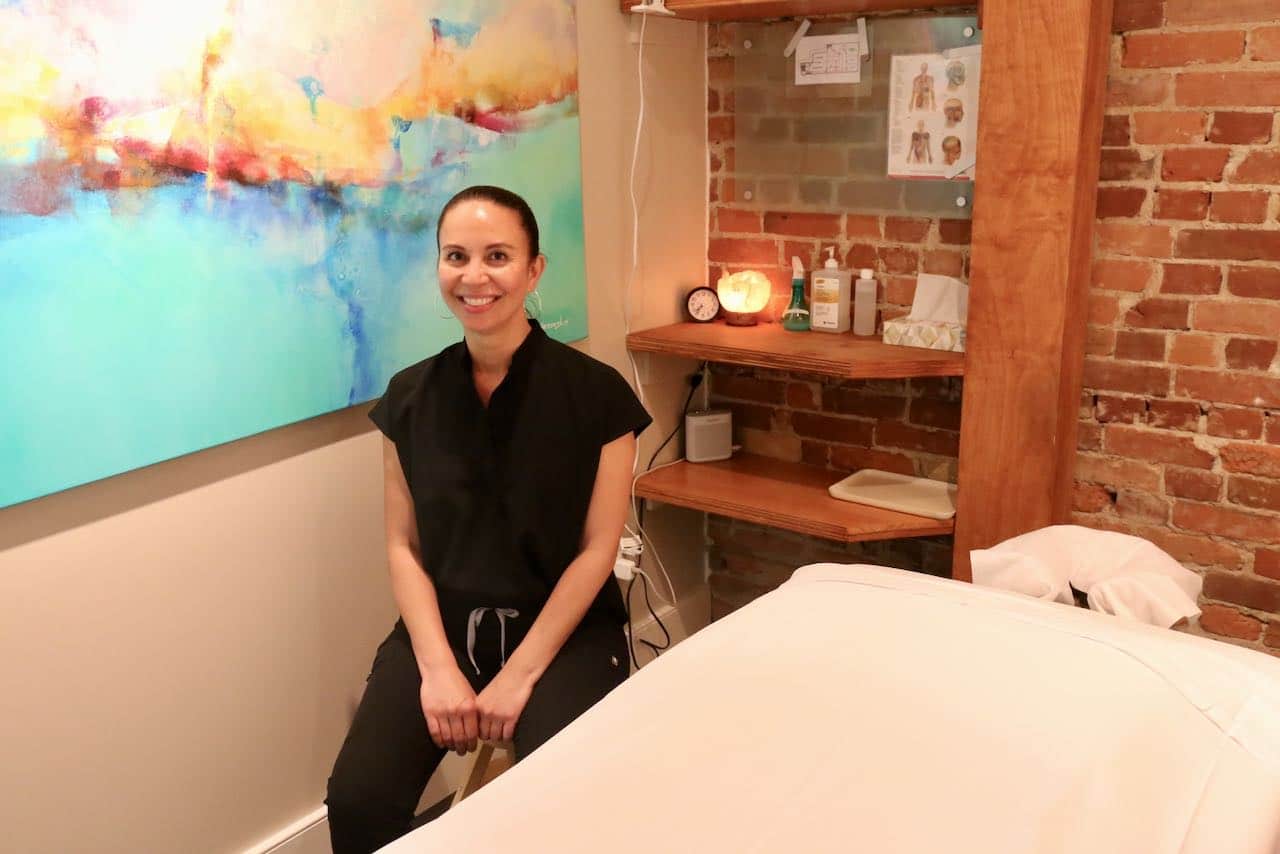Find yourself researching the best documentaries to watch at Hot Docs 2019?
Hot Docs Canadian International Documentary Festival, North America’s largest documentary festival, conference and market, returns to Toronto for its 26th run from April 25 to May 5, 2019.
Showcasing the best in Canadian and international documentary, Hot Docs 2019 will welcome filmmakers, industry, media and audiences to downtown Toronto for an 11-day event.
Hot Docs 2019 will feature 234 documentaries, 18 interdisciplinary projects from 56 countries, with 54% of directors in the program being woman.
We’ve screened a majority Hot Docs 2019 documentaries in advance to give you the scoop on what films are worth waiting in line for.
Save this story to Pinterest so you can look at it later!

Must-See Documentaries at Hot Docs 2019
This year our Hot Docs must-see list focuses on four of our favourite themes, all of which focus on stories pertaining to marginalized communities.
Read through our complete Hot Docs 2019 must-see list and you’ll find documentaries that share inspiring stories about the LGBT community, people living with disabilities, Indigenous issues and films where females are offered a spotlight.
Hot Docs 2019: LGBT Documentaries
Some of our favourite films at Hot Docs 2019 are documentaries that share stories of the gay, lesbian, bisexual and transgendered community. This years festival offers inspiring gay documentaries featuring queer families, bisexual sex workers, queer black dancers and celebrated drag queens.
Killing Patient Zero
Director Laurie Lynd offers an essential history of HIV and AIDS in the US and Canada through Killing Patient Zero. Likely to be one of the best gay documentaries of 2019, Killing Patient Zero offers insight into how the AIDS crisis came to be.
The film begins in 1981, seven years after homosexuality had been de-classified as a mental illness in North America. At the time there was a joyful feeling of progress and gay liberation. Then suddenly a mysterious new disease was killing gay men.
Initially called the “gay plague,” and “gay cancer,” the AIDS crisis became a shocking demonstration of deeply-rooted homophobia at the time. Thousands of gay men died before the media paid any attention or politicians publicly recognized the severity of the situation.
The LGBT film shares snap shots of the past that are seamlessly interwoven with personal interviews of those who were directly linked to Patient Zero, the man accused of spreading AIDS in North America.
The Quebecois Air Canada flight attendant was vilified as the embodiment of gay hedonism and promiscuity. In the early days, San Francisco locals referred to it as a “gay waiters disease,” and weird theories demonizing the use of poppers as the cause of the AIDS epidemic were rampant.
The Right Wing demonized the gay community with Christian fundamentalists shouting that AIDS was a punishment from God on the gay community. The short-lived gay sexual liberation movement crashed with conservatives who essentially dismissed their humanity, “this is the price you pay for what you are and what you do is wrong.”
When the book “And the Band Played On” was released, Patient Zero was outed and an LGBT hero’s contribution to fighting the epidemic was lost. While Patient Zero and his family were vilified in the press, in actuality, the Air Canada flight attendant shared a list of his sexual partners with Centre for Disease Control to help track and control the spread of the “gay plague.”
Killing Patient Zero is essential viewing at Hot Docs 2019, offering a uniquely Canadian perspective and history on the politics and discrimination that helped AIDS spread so rampantly.
Searching Eva
Eva is a 25 year old Italian living in Berlin. She’ determined to show the world that “you can pretend to be whatever you want to be.”
In Searching Eva, Director Pia Hellenthal creates a portrait of a young woman who models her message through selfies, sex scenes and social media comments that brilliantly capture how we can be everything and nothing all at once.
Eva is a complex character, and this autobiographical documentary offers a personal portrait showcasing her identity as a cat owner, poet, bisexual, sex worker, recovering addict, feminist, anarchist, fashion model and Virgo.
Searching Eva does an excellent job at showcasing a Millennial mind that has grown up online. Like so many young people today, Eva looks at her life as a curated document. Reality is virtual and life is “kind of like an indie movie.”
While the documentary discusses heavy material such as sex work, childhood abuse and drug addiction, there’s plenty of humour to be had too. Eva at one point reveals it took her 7 years to finally have an orgasm. Chirping, “I’d prefer to eat bread than have sex.” Later, while lying naked with two men in bed she questions if she might be asexual.
We’re introduced to Eva as a gaunt model who can be found walking the runway at Paris Fashion Week for Vetements. Fast-forward and she’s seen flicking heroin needles with fellow sex workers. Her life runs from glamour to grunge.
In Searching Eva, the audience watches its imperfect protagonist as she reveals her fragmented personalities with admirable honesty. The film is a poignant portrait offering a spotlight on the struggles of everyday sex workers and those who simply find themselves living between the lines.
Drag Kids
Drag Kids is one of the most inspiring LGBT documentaries in the 2019 Hot Docs program. Director Megan Wennber follows preteens Stephan, Jason, Bracken and Nemis as they prepare to perform in drag as a group at Fierte Montreal Pride.
Unlike their classmates, they share an unusual interest in dressing and performing in drag. While their queer passions leave them isolated from peers on the playground, the support of their unflinching parents allow the four drag kids to proudly showcase their gender-bending art on stage.
We excitedly watch as the children first meet in Montreal, flying in from the US, UK and Canada. It’s a marvel to witness the group fawn and frolic over the drag culture they typically enjoy in isolation. They offer helpful tips on how to best apply makeup and strut in heels. In Drag Kids, the audience giggles with glee as these newbie qweens show they aren’t afraid to compete in the adult world of competitive voguing and lip syncing.
Drag Kids is essential viewing for young children who have a desire to express their gender through performance. But the LGBT documentary’s biggest takeaway is the importance of having a loving parent to encourage you along the way.
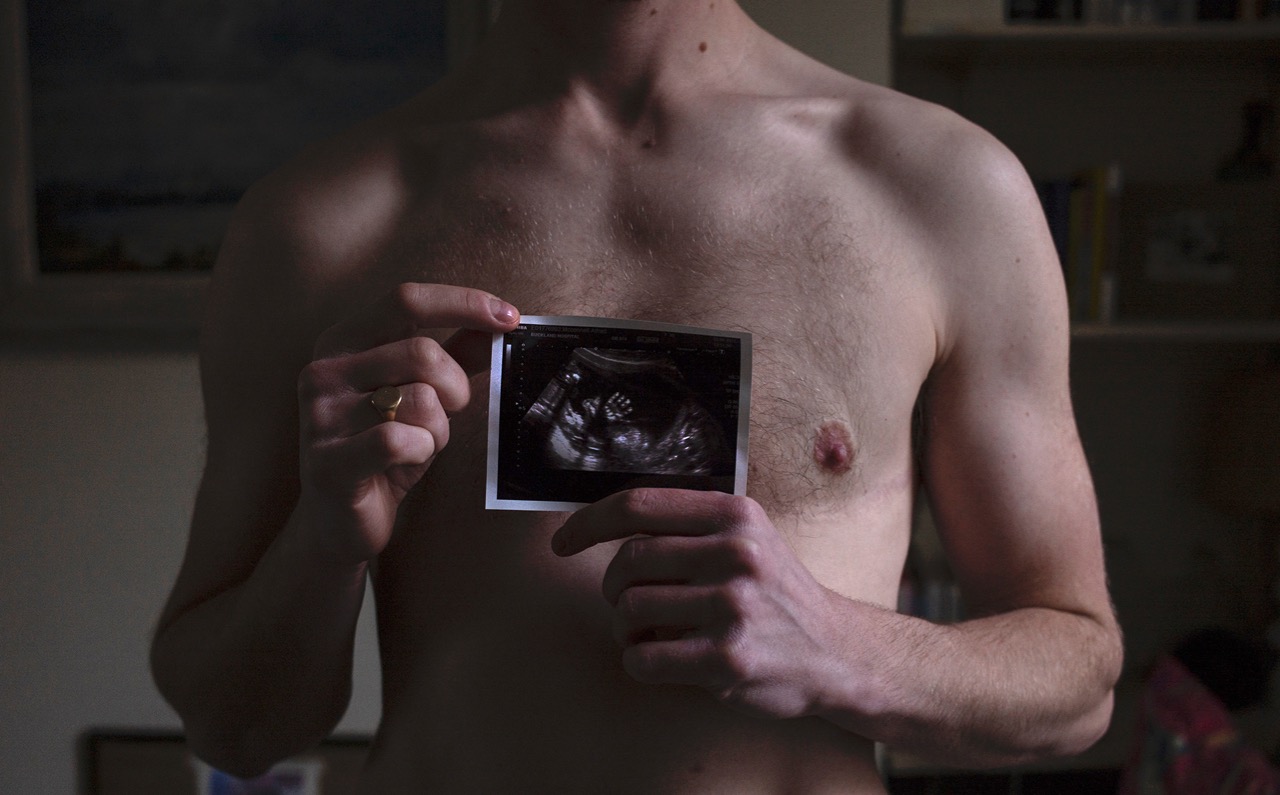
Seahorse
Director Jeanie Finlay presents Seahorse, an intimate tale that follows Freddy, a British trans man who dreams of becoming a father.
Fully aware of the complications and hardships of attempting a pregnancy, he bravely marches ahead to having a child. Over three years, we watch the emotional, mental and physical toll rise, as he and his partner endure unsuccessful attempts.
Freddy stays determined by reflecting on his own upbringing through old photos and home movies. Raised mostly by his supportive mother, Freddy struggles with how to break the news to his absentee father. Seahorse offers moody lyrical storytelling paired with incredibly intimate access to a transgendered mans unique journey. If you’re looking to find inspiration in an LGBT narrative, Seahorse may just be the best trans documentary of 2019.
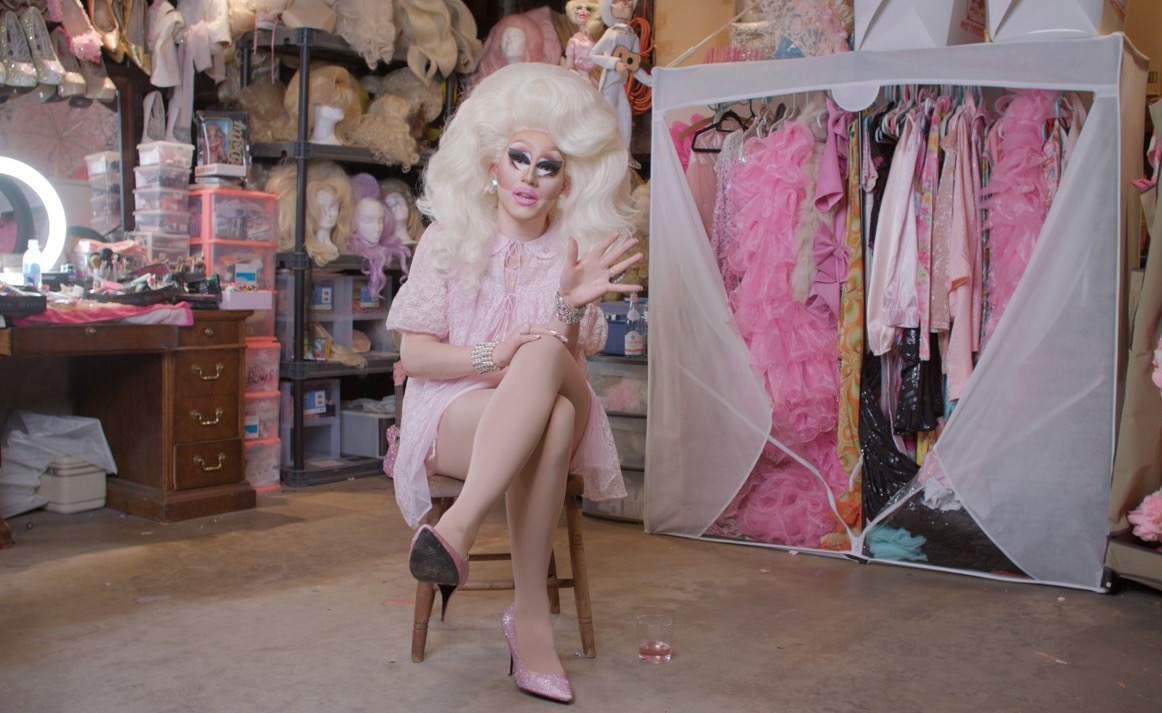
Trixie Mattel: Moving Parts
RuPaul’s Drag Race fans in Toronto are sure to arrive in droves for the opening night screening of Trixie Mattel: Moving Parts. The celebrated half-Ojibwa American Drag Queen is a celebrated folksinger, TV personality – and winner of season three of RuPaul’s Drag Race All Stars.
The highly anticipated drag queen documentary offers a VIP backstage pass to Trixie’s one-woman show tour. While Trixie Mattel may offer up a delusional confidence, the man behind the makeup, Brian Firkus, does not. His tension is what makes his drag persona so revealing and unguarded.
Trixie Mattel: Moving Parts offers insights into the award winning drag queens performances and personal life. RuPaul’s Drag Race fans will have an opportunity to peek behind the curtain and explore the darkness often required by comedians, the stress of being centerstage, and the monotony of life on the road.
Sure to be one of Hot Docs 2019’s most talked about LGBT documentaries, Trixi Mattel: Moving Parts does an excellent job at showcasing how fleeting friendship and fame can be.
My Dads, My Moms and Me
Documentary filmmaker Julia Ivanova returns with a follow up film to hr 2007 success Fatherhood Dreams. Her groundbreaking LGBT film followed four gay men who faced homophobic comments when they decided to raise babies after same-sex marriage was legalized in Canada in 2005.
Julia Ivanova brilliantly captured the barriers these gay men overcame to create their modern families. She followed Randy and Drew who adopted baby Jack, Scott connected with a surrogate to have twins Ella and Mac, and Steve fathered Zea and Jazz in a co-parenting relationship with lesbian mothers Wendy and Cory.
In My Dads, My Moms and Me, Julia returns twelve years later, to document the growth of these LGBT families. The touching film includes flash backs from Julia’s first documentary, which are woven into present day interviews with the kids and their gay parents.
My Dads, My Moms and Me is a must-see at Hot Docs 2019 because it offers intimate insight into how some of Canada’s first gay parents created their families. They reveal the struggles they faced by a judgemental society, as well as at home as first time parents looking to navigate their newfound roles.
Our Dance of Revolution
Canadian Director and Producer Phillip Pike presents an essential history of Toronto’s LGBT Black community with Our Dance Revolution.
His powerful documentary premiers at Hot Docs 2019, telling the untold story of Toronto’s Black Queer community. The film reviews four decades of passionate activity and rebellion in Canada’s largest city.
The audience is informed about the Black LGBT struggle in Toronto through a kaleidoscope of personal stories. We meet the friendly founder of a 1970s lesbian commune, passionate Black Lives Matter activists and dedicated community organizers.
Our Dance of Revolution should be required viewing for all members of Toronto’s LGBT community. For those who were immediately outraged and annoyed when Black Live Matters caused a “disruption” at the Toronto Pride Parade…Our Dance of Revolution was made for you to mull over.
This historical Canadian gay documentary offers an intersectional perspective, showcasing how Queer people of colour are treated in a city that sees itself as so liberal and inclusive.
Our Dance Revolution showcases trailblazers who demand a city where they can live their truths free from the threat of violence. One can’t help but find inspiration in the Black LGBT Torontonians who bravely protested police brutality, formed feminist collectives, and offered space for grief and healing during the HIV/AIDS epidemic.
Hot Docs 2019: Disability Documentaries
Some of the most inspiring films at Hot Docs 2019 are documentaries that offer insight into the lives of those living with disabilities. This years festival offers inspiring disability documentaries featuring deaf families, a father with multiple sclerosis and the important role played by therapy dogs.
Inga Can Hear
Inga lives in rural Latvia. She’s the only hearing member of her household, playing protector as the family’s de facto sign-language interpreter ever since she was 7 years old.
Director Kaspars Goba’s Inga Can Hear, reveals the unravelling of a child whose been forced to give up the innocence of childhood to connect her deaf family to the hearing world.
We meet Inga as she’s entering her teenage years. She’s trying to carve out an identity of her own, but constantly feels responsible for her family back home. Her mother and father are keen to have her stay at home and stop her studies. She anxiously realizes her opportunities will be limited in life if she doesn’t explore and discover beyond her tiny deaf family.
When Inga decides to register for a secondary school located far from her little town, the family begins to feud. How will the family cope without her interpreting their every move? And how will Inga manage in a conversational world?
Inga Can Hear does an excellent job at showcasing the economic and social effects of those living in deaf communities. It’s blaringly obvious that a deaf family has less opportunity in a world designed for those who can hear.
Audiences will marvel at Inga’s heroing intersectional tale. Forcing us to reflect on our own everyday privilege. We can’t help but empathize for the young and opinionated Latvian tween as she attempts to untether. Plunging herself into a world full of sound. Culture clashing with neighbours in her own backyard. And coming to terms with Edward, the birth of her transgender identity.
Buddy
Dutch filmmaker Heddy Honigmann, recipient of Hot Docs’ 2007 Outstanding Achievement Award, presents Buddy. Her newest documentary is a heartwarming tale showcasing the unique and tender connection shared between service dogs and their disabled owners. It’s a must-see documentary at Hot Docs 2019 for dog lovers.
Buddy brilliantly explores the unique emotional bond service animals share with their needy owners. Honigmann showcases the diversity of these relationships by following six canine and human pairs. The audience follows a veteran with PTSD, autistic child with physical challenges, and elderly soldier blinded by a WWII explosion.
Buddy’s most impressive canines are Kaiko and Makker. The dog duo easily pull drawer handles and signal approaching doorways. And while all of the service dogs in Buddy help with their owners day-to-day challenges, it’s their remarkable ability to offer their owners access to the world that leaves the most lasting impression.
Dog loving audiences will certainly walk away with a newfound appreciation for their pets. You’ll also likely find yourself fascinated over the wildly developed emotional intelligence these service dogs exhibit. They enable the disabled to occupy public spaces with ease, and temper anxieties around social exchanges. What’s clear is that service dogs are highly intelligent and emotional animals, helping some of the most fragile humans navigate life’s physical and emotional challenges.
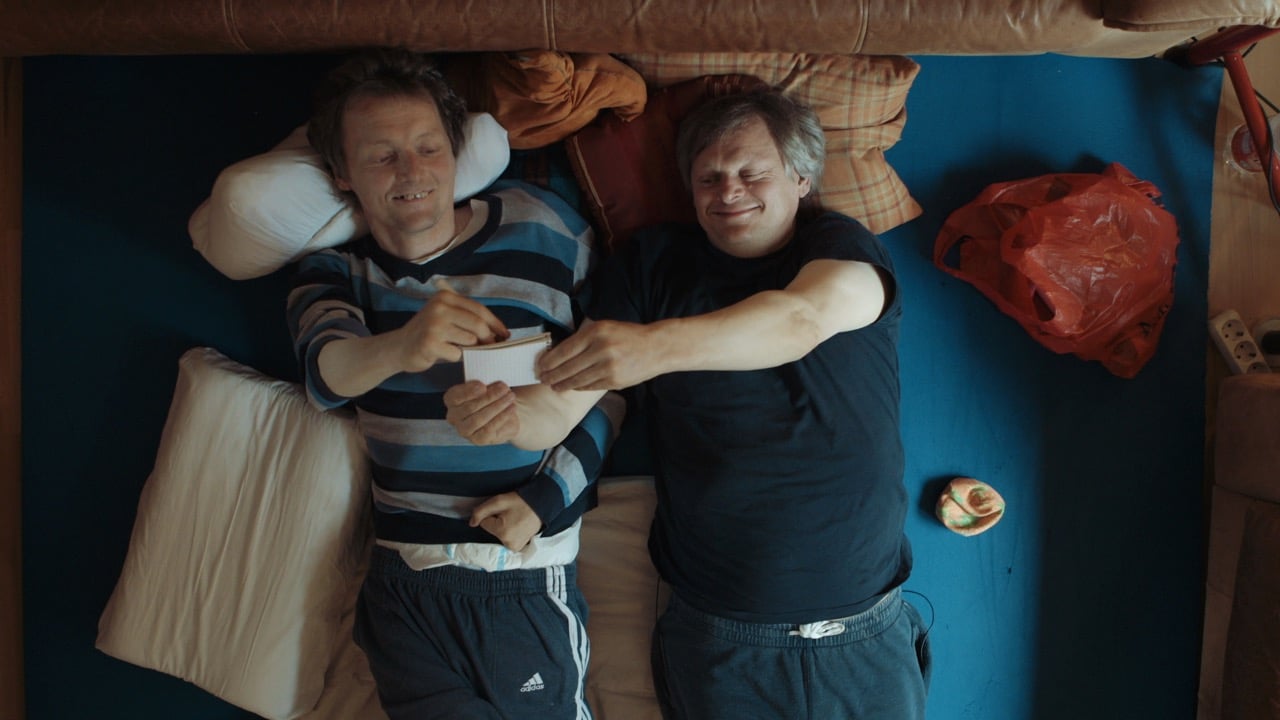
Dear Brother
In Director Julia Horn’s Dear Brother, we follow Markus Becker’s recovery journey after being tragically hit by a car. His German doctors in Saarland say he only have a few days to live. His determined brother has a more optimistic approach.
While his father is making funeral arrangements, his brother Michael refuses to accept the prognosis. Heartfelt and hellbent on ensuring his brother survives, Dear Brother offers a poignant portrait on how disability affects friends and family.
Michael puts his life on hold to tenderly care for his disabled sibling. The touching documentary about disability does a brilliant job at tapping into the honest essence of brotherly love. We watch Michael as he takes on his brothers care, devising strategies and exercises to keep his catatonic brother reach a positive path to recovery.
Everyday he engages his brother in familiar sounds, conversation, videos, and touch therapy. Michael helps his disabled brother foster a creative world inside of his mind. And by the end the audience must wonder, “which brother is bring the other back to life.”
Hot Docs 2019’s Dear Brother is a heartwarming documentary, which first and foremost highlights the importance of a caregiver. It brilliantly asserts that love is the most important aspect of the healing process. Audiences will wake up to the world realizing that an often feared disability diagnosis can enrich our lives in ways we never thought possible.
Lourdes
Every year, the small town of Lourdes in southern France plays host to millions of pilgrims from around the world. Ever since a peasant girl saw apparitions of the Virgin Mary 160 years ago, the city has become one of the world’s most important sites for religious tourism.
Among the thousands of devote Catholics who arrive each day, the most humbling are the sick and disabled, who make the trip in hopes of a miraculous healing.
Documentary filmmakers Thierry Demaizière and Alban Teurlai offer an honest portrait of this humbling migration in Lourdes. The French duo follow a handful of disabled hopefuls, while also witnessing the tireless work done behind-the-scenes.
We peak behind the curtain, a fly on the wall at the city’s iconic cathedral. The audience watches as cardinals and priest prepare for mass, who are followed by assistants who ensure each days itinerary runs smoothly. We wander through the gift shop, where those on a journey of hopeful healing come to purchase religious trinkets and treasures.
Lourdes is one of the most thought provoking documentaries at Hot Docs 2019. For those who live their lives steeped in Christian religiosity, Lourdes will feel affirming. While those in the unspiritual camp will wrestle with the Catholic churches money making. Some will find it challenging to watch pilgrims who clearly display a magical desire to see the silhouette of the Virgin Mary smiling back at them.
It’s the hardworking female staff who tend to each disabled guests needs with tender love and care that leaves the most lasting impression. Lourdes bright conclusion offers a touching scene moments after the last sick pilgrim waves goodbye. A group of melancholy Catholic nurses brush tears from their eyes while slowly breathing through a joyful laugh. Their work has been physically, spiritually and emotionally challenging but they find hope and happiness in their fearless and faithful guests.
The Magic Life of V
Finnish documentary filmmaker Tonislav Hristov presents a poignant documentary that offers insights into the effects of childhood trauma, families with disabilities and the pain of having an alcoholic parent.
The Magic Live of V is filmed in the sombre and snowy landscape of rural Finland. The documentary focuses on telling the story of Veera, a young woman who struggles with heavy trauma. While she struggles to resolve her past pains with an abusive alcoholic father, her present has her taking care of a disabled brother.
The Magic Life of V is a must-see at Hot Docs 2019 for its fascinating look at how trauma can be treated in a fantasy world of live-action role play. Under the watchful eye of caregivers and therapists, Veera is encouraged to regularly transform into V, a brave and bold fantasy persona who experiences adventures in mythical worlds.
She’s joined by other teens struggling to deal with trauma who dress up as Harry Potter characters, overcome actors dressed as otherworldly monsters and even engage in an epic Medieval-style battle.
For those who have only considered therapy as “laying on a couch with a shrink staring at the ceiling, The Magic Life of V blows limitations out of the water.
When We Walk
A decade ago New Yorker Jason DaSilva was diagnosed with a severe form of multiple sclerosis. Since then he’s fought for his independence, despite his dependence on a wheelchair and around-the-clock support.
Jason DaSilva’s tearjerker When We Walk, is an autobiographical love story made for her son. When DaSilva’s marriage ends and his ex-wife moves their three-year-old son to Austin, new obstacles emerge.
He struggles to relocate himself to be closer with his son in Texas. Unfortunately, the quality of care he’s used to in New York City doesn’t exist for Medicaid users in Texas.
DaSilva reflects on his own life growing up with divorced parents who lived in different countries. He’s determined to be present in his son’s life even though the stress of flying regularly takes its tole and ends him up in an ambulance.
When We Walk is a beautiful love letter from a disabled father to a young son who can’t totally grasp what’s going on around him. As DaSilva’s multiple sclerosis deteriorates be becomes ever more aware of how urgent his father-son relationship must be.
The film’s subject is also its director, producer, writer and cinematographer. The uncensored and intimate autobiography offers a critique of the inequality facing the disabled community. But more important follows a loving father as he makes peace with his fate while holding his son’s attention.
Hot Docs 2019: Indigenous Documentaries
The Indigenous Documentaries being shown at Hot Docs 2019 share stories of upheaval and the unfortunate realities that these diverse communities have lived with for hundreds of years.
From the banks of Xingu River in the Amazon to the tragic death of Saskatchewan’s Colton Bushie, these films command our attention and invite us to understand the truths that have been ignored for far too long.
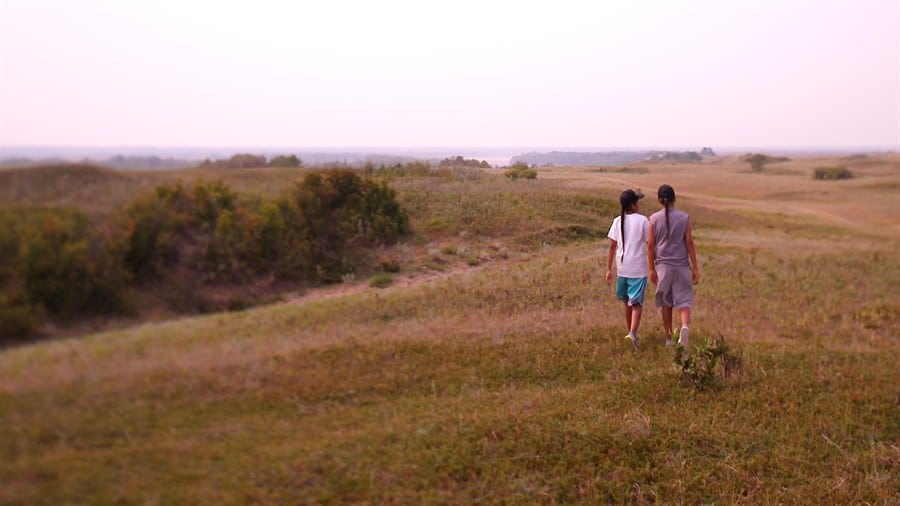
nîpawistamâsowin: We Will Stand Up
There are certain events that rock the national consciousness in a way that will never be forgotten. The death of Colton Bushie by the hand of Gerald Stanley in 2016 was one such event. nîpawistamâsowin: We Will Stand Up chronicles the RCMP investigation and subsequent trial, where Stanley was found not guilty of second-degree murder.
Writer/director Tasha Hubbard wades through the aftermath of protest with a steady hand, following the Bushie family as they search for any justice or truth to what happened to their son that night. From the night of his death to the floor of the UN, Bushie’s family are met with cold realities of the Canadian judicial system at every turn,
nîpawistamâsowin asks a lot of questions but doesn’t have many answers. It provides a sense of righteous anger as we are shown explicitly, the issues plaguing Canadian indigenous communities and how after centuries of injustice and colonial violence, their country continues to fail them.
Making its Canadian debut on the opening night of Hot Docs 2019, nîpawistamâsowin: We Will Stand Up will force sold-out audiences to wrestle with uncomfortable realities that have been ignored for too long. This is a good thing.
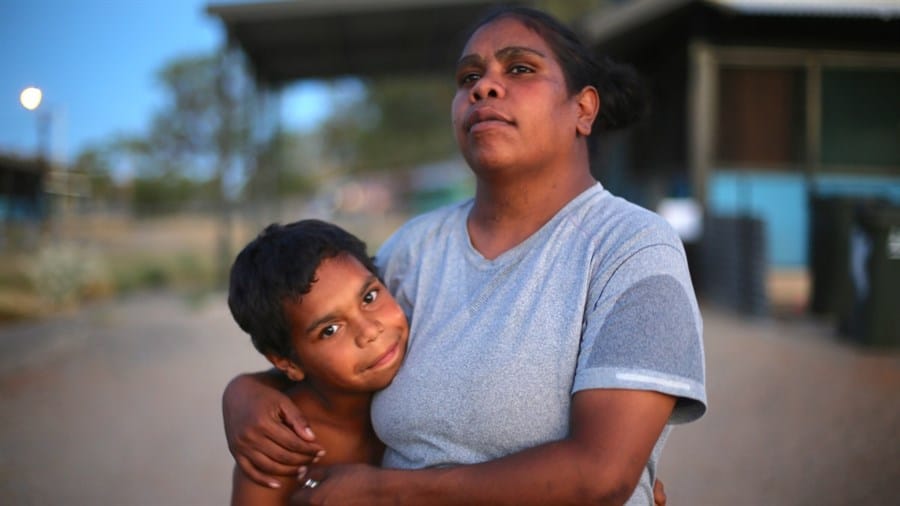
In My Blood It Runs
In My Blood It Runs tells the story of Dujuan, a 10-year-old Arrernte boy from Mparntwe (Alice Springs) in Australia as he struggles with the Westernized school system and its colonial infrastructure cutting away at the indigenous identity.
With the help of Dujuan’s family, director Maya Newell follows the child as he his bilingual abilities and charming personality to establish himself as a politically astute leader in the making. At the time of filming, 100% of the youth in Alice Springs detention centres were Aboriginal, and it becomes increasingly clear throughout its 84-minute runtime, that this western school system is steering Dujuan towards a similar fate.
What follows is Dujuan’s family and a community’s emotional journey through the fight to mend an educational schism between traditional culture and colonial ideas and solidify a future for the youth. In My Blood It Runs is a fascinating look at the ways in which hate is not only taught but how hate is unlearned, picked apart and disregarded in favour of love and
Hated by his army colonel stepfather, punk rock teenager Eka is forced to the fringes of Indonesian society – one that met tattoos and cultural identity with death and imprisonment during Suharto’s regime in the 1980s.
A Punk Daydream’s director, Jimmy Hendrickx, uses a mix of documentary footage, live performance and photography to share the story of Eka and his friends. Wandering through polluted cityscapes, Eka come to feel closer to the environmentalist ideals of the local Indigenous tribes struggling to maintain their traditional way of life, than they do with the company’s their expected to work for. The same companies destroying forestland in favour of big business interests.
It’s a film that explores the generational shift that’s ambitious across many societies, and what happens when that shift in perspective is stifled by societal stubbornness. If you’re looking for a documentary with a wicked soundtrack, daydream visuals and a visceral message, definitely check out A Punk Daydream.
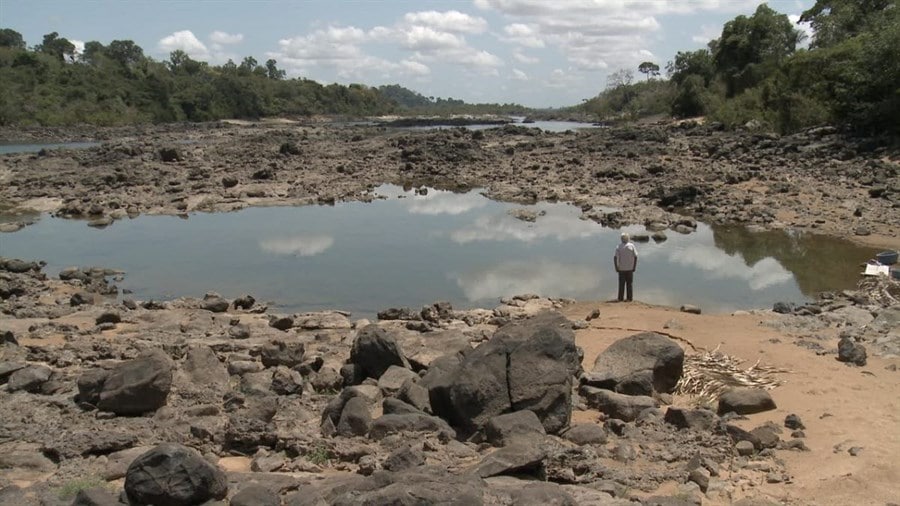
River Silence
The construction of the Belo Monte—one of the world’s largest dams—along the banks of the Xingu River in the Amazon Basin has destroyed the lives of families living there.
River Silence follows the displacement of three families, as they move from the banks of the Xingu River to Altamira, a city plagued by unemployment, a lack of secure shelter and rising violence.
Director Rogerio Soares combines journalistic analysis with surreal, dreamlike footage of the river and what it provides the indigenous tribes who live there and the urban chaos that decimates the lives they’re used to.
River Silence tells the unfortunately common story of economic displacement and broken promises levied at the indigenous communities whose lives are uprooted in the name of natural resource mining. With stunning visuals and a potent narrative. The indigenous documentary captures the destruction of a community and how those communities adapt as a form of resistance, refusing to leave behind the culture they’ve held for hundreds of years.
Dying for Gold
Dying for Gold invites us to witness the human cost of extractive industries and the murderous legacy of colonization.
After colonial governments discovered massive gold deposits in South Africa, thousands of Indigenous men were met with promises of steady work and decent pay. But of course, as is par for the course with history, they were instead met with working conditions that would spark one of the world’s largest epidemics of silicosis and tuberculosis.
Directors Catherine Meyburgh Richard Pakleppa weaves devastating stories from the affected families with the 120-year-old colonial conspiracy to remove those indigenous familes from their land.
And as the film documents the present day, 5-billion-rand settlement in South Africa’s largest class action lawsuit against mining companies, Dying for Gold shows us how these same Indigenous communities are now reliant on mining incomes for survival.
Dying for Gold is a powerful film that should be on everyone’s must-see list for Hot Docs 2019.
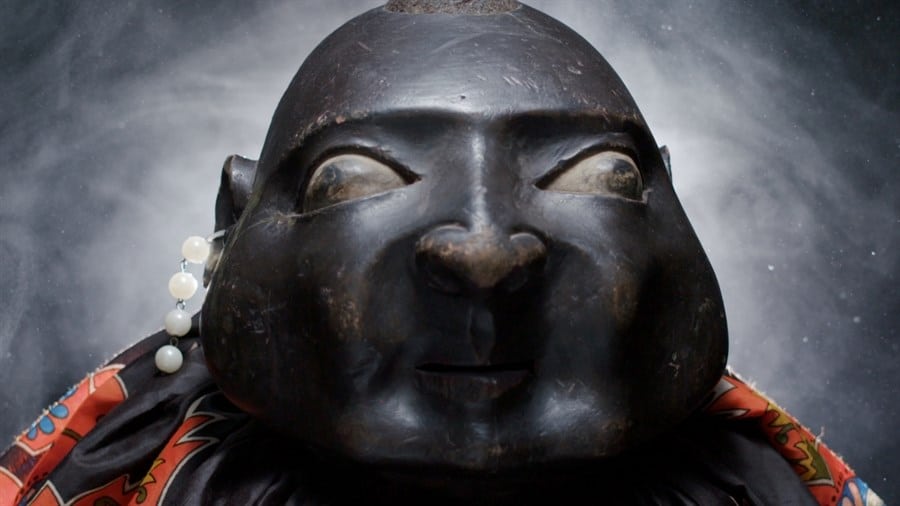
The Sound of Masks
In The Sounds of Masks, Atanásio Nyusi dances as a way to speak out against the colonial history of Mozambique. His politically rebellious movements are punctuated by a mask once banned during the country’s 10-year-long War of Independence against the Portuguese.
After decades of displacement, the dance is revived as a celebration of freedom for the millions of people who have returned, and it’s here where Director Sara CF de Gouveia tells her story.
As Atanásio Nyusi tries to restore the communities collective memory through this dance, The Sounds of Masks asks what will happen once he’s gone. It’s a beautiful film that follows a community as they fight to rebuild their families and remember the ancestral rhythms of their land.
Hot Docs 2019: Inspiring Female Documentaries
The inspiring female documentaries premiering at Hot Docs 2019 share diverse perspectives from all over the world. While each documentary’s story might be unique and different, the narrative explores universal themes of motherhood and fighting back against the patriarchy.
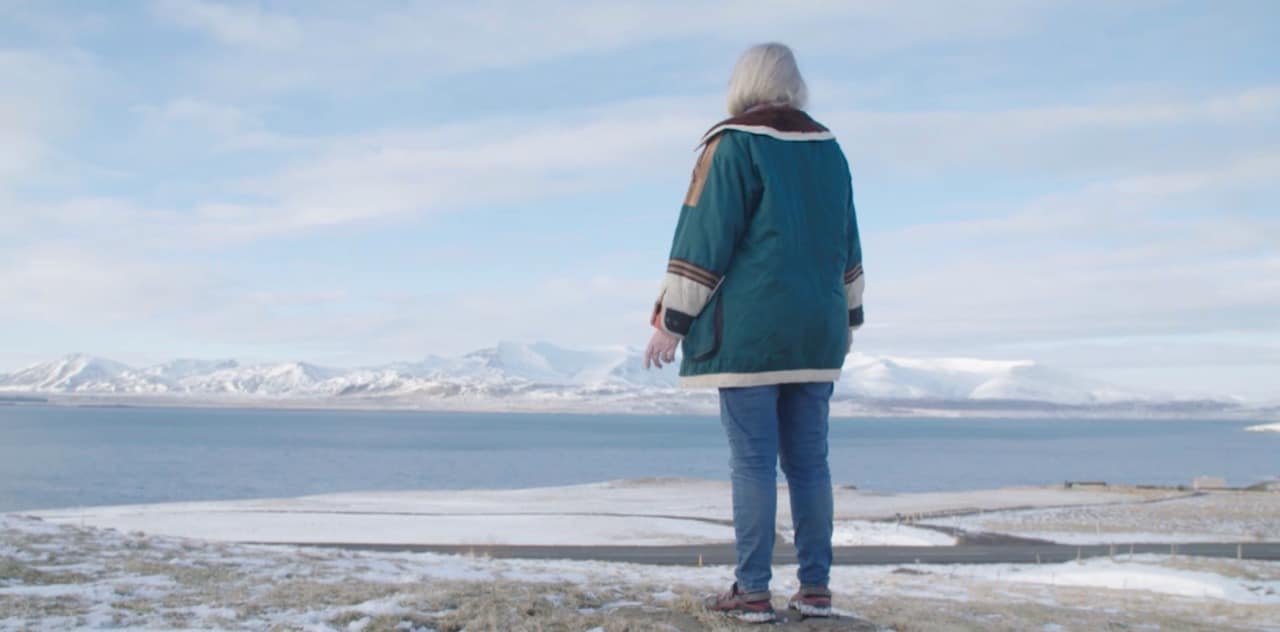
The Seer and the Unseen
If you’re keen to find a spark of magic at Hot Docs 2019, grab tickets to filmmaker Sara Dosa’s The Seer and the Unseen. Audiences are transported to the spectacular and spellbinding landscapes of Iceland, famous for its ancient viking lore and dramatic waterfalls.
The tiny island nation is also famous for its belief in a parallel magical world, seen only by those who possess “the second sight.” While most tourists see Iceland’s elves sold in gift shops and as statues mounted beside major attractions, The Seer and the Unseen offers a glimpse into the spiritual connection locals have to invisible communities of elves.
The fascinating film centres around Ragga, a grandmother and environmentalist, who is also one of the rare few in Iceland recognized with the magical abilities to communicate with her elven neighbours.
When I visited Iceland I took a tour of Westfjords, the country’s most remote region and my local driver explained the headlines in the news about a highway that had to be rerouted because its initial construction plans cut through an invisible ancient elf castle and fort. For visitors it’s easy to shrug off as superstitious folklore. The Seer and the Unseen makes the reality of Icelandic spiritual beliefs more relatable as we follow Ragga’s emotional journey to protect her invisible friends.
She’s hellbent on maintaining the harmony of the land by respecting the unseen occupants who call Iceland’s rocky cliffs, black sand beaches and fantastic fjords their home. When the largest bulldozer in the country threatens to destroy a historic lava field, Raga and her team of activists step up to save those who can’t be heard.
The Daughter Tree
Documentary filmmaker Rama Rau explores the reality of what it’s like to live in rural India as a woman in The Daughter Tree.
The audience is taken to a small village in India’s Punjab region to meet Neelam Bala, a passionate and protective midwife working to save unborn baby girls. It’s an arduous mission in a country that has a strong preference for having sons.
The award-winning filmmaker weaves a narrative that showcases Neelam’s inspiring story and juxtaposes it against the Village of Men, so called because not one girl has been born here in over two decades!
The men are desperate to get married but must look elsewhere to fulfill their expectations of family life as their own hyperlocal culture has not sustained a natural harmony of men and women.
Compare her quarrels with the patriarchy to the magical Village of the Daughter Tree, which plants a tree every time a little girl is born. Once an adult, the girl can use the fruits from the tree to earn a living and gain economic freedom from a society that leaves little opportunity to women.
The Daughter Tree paints a complex portrait of how one of the world’s largest countries is grappling with lopsided ratios of men to women. The champions here are the women fighting back the alarming imbalance.
#Female Pleasure
Filmmaker Barbara Miller presents a fascinating look into how the world perceived women’s sexual desire in #Female Pleasure. The must-see Hot Docs 2019 documentary follows five women from five different countries who passionately advocate for autonomy over their bodies.
Each feminist pioneer refuses to live by the rules their society or religion has imposed upon them. The audience follows their personal protests from Tokyo to Ethiopia.
Manga artist and Japanese performer Rokudenashiko made international headlines after making art out of her vulva. She was arrested in Tokyo after creating body positivity messaging for women encouraging them to explore and love their vaginas. Even going so far as it hilariously create a 3D imprint of her private parts and having them sculpted into a kayak.
Facing expulsion from her Hasidic community in Brooklyn, Deborah Feldman takes her baby and escapes the patriarchal society she found suffocating.
In London, Ethiopian immigrant Leyla Hussein dares British men to simulate the horrors of female circumcision using scissors on malleable clay. She later travels back to Africa to chat with female elders in a tribe to educate and encourage them to stop the destructive practice.
In India, Vithika Yadav fights back against daily street harassment by championing female pleasure as a journalist who speaks the truth online. She even has an uncomfortable encounter with a Hindu leader who dismisses India as not having a problem with homosexuality.
Doris Wagner is a former nun from Germany who was raped in a convent by her priest and now fights sexual abuse in the Catholic Church. Yes, she writes a letter to the pope and no he doesn’t fire her attacker.
Female Pleasure is one of the best feminist documentaries at Hot Docs 2019. It offers a fascinating look at how female bodies are shrouded in shame, and the activists that are fighting misogyny head one.
Knock Down the House
Knock Down The House is releasing at the perfect time. Netflix’s high-profile documentary, premiering at Hot Docs 2019, shares just how exactly change swept into United States Congress.
It shares the perspectives of congress-hopefuls Alexandria Ocasio-Cortez, Amy Vilela, Cori Bush and Paula Jean Swearengin throughout the year leading up to the midterm elections. It’s a fascinating look at the personalities who, as the film shows, flipped the script on U.S Congress and, in the case of Ocasio-Cortez, are actively looking to implement meaningful change from the inside out.
Director Rachel Lears moves between the perspectives at a good pace, and while AOC is a central narrative focus, each woman is given ample screen time. And the narratives—as they move from grassroots longshots to legitimate congress contenders—are fascinating. There’s a scene in the film where each of the candidates meet each other at a campaign event. It’s a heartwarming as they share philosophies and encouragement to each other.
We’re there for the ups and the downs of their journeys and when the realities of modern politics do set in, its a cold reminder just what these people are up against. But when the eventual moment does happen for Ocasio-Cortez (This is obviously not a spoiler) its the quiet moment where she reflects on her accomplishment that is so emotionally beautiful it hurts.
Shot on a shoestring budget—with Lears and co-writer Robin Blotnick filling multiple production roles—Knock Down the House, is ultimately a reflection of an America that’s had enough of a corporatized government more concerned about donors and reelection than the people they represent.
Knock Down The House is not only going to be a breakout documentary for 2019, it’s an important film that follows a prescient change in the
Ask Dr. Ruth
Documentary filmmaker Ryan White shares one of our favourite must-see feminist films at Hot Docs 2019, featuring America’s favourite sex therapist. In Ask Dr. Ruth, audiences are taken on a ride to explore the life of 90-year-old sexual health expert Ruth Westheimer.
Recognized as a trailblazing woman in America, Dr. Ruth offered insight into everyday sexual health with an approach that was non-judgemental and honest. Most recognize the tiny (4 feet 7 inches) sex therapist from appearances on the Late Night show circuit and a hilarious Herbal Essences ad. In Ask Dr. Ruth director Ryan White presses the famous sex educator to open up about herself for the first time.
The film offers an equally funny and touching portrait of Ruth, a Jewish Holocaust survivor who found success and fame after a move to America. Dr. Ruth reflects on the trauma of growing up as an orphan, traveling to Israel to discover the cause of her parent’s death, at Yad Vashem in Jerusalem.
Through a painful past, Dr. Ruth survived by fuelling her deep curiosity of human nature. Sure to be one of 2019’s most popular feminist documentaries, Ask Dr. Ruth acts as a poignant reminder to how quickly society has changed in its comfortableness with conversations around sex. Her distinct, heavily accented German voice offered advice to everyday Americans from the elusive clitoris to “normal frequency of masturbation.”
Throughout her career Dr. Ruth has always insisted on staying out of politics. She wanted to ensure that her healthy messages about sex were not disregarded or discredited because of an audience member political beliefs. In the 1980s her support of the LGBT community and women’s right to choose, then an unpopular opinion, helped pave the way for other activists to shape a more inclusive sex positive society.
Push
Push is a disturbing look at the global housing crisis that seems to be getting worse by the day. Filmmaker Fredrik Gertten puts the audience in the shoes of Leilani Farha, a UN Special Rapporteur on the Right to Housing.
We follow Farha on a journey for answers as to why housing has become such a crisis. Often, Farha is just as shocked as us, and her open emotional struggle with the stories she records of families trying to stay afloat is palpable.
Push pulls back the curtain on the dark side of real estate and the giant nameless corporations that sit at the centre for this struggle for basic human rights in the context of housing. It’s a beautifully shot documentary that has a variety of interesting talking head interviews to explain the various problems and potential solutions.
Travelling from Toronto to New York to London and Barcelona, Farha is the constant for the film. Push draws parallels between each city while presenting unique issues that aren’t close to being solved.
Having Toronto as a narrative focal point of the film hits home, given the nature of Hot Docs and where the festival is located. If you live in the city or GTA, Push is a fascinating look at the realities plaguing many of the city’s people.
Beyond the Visible – Hilma af Klint
The world of abstract art would not exist if not for Wassily Kandinsky. Beyond the Visible – Hilma af Klint explores how the Swedish painter was forced into obscurity by an art world’s reluctance to give a woman her rightful place in history.
The film follows the reemergence of her work, first in the 1980s and again now with the Guggenheim exhibition “Paintings for the Future,” which the film focuses it narrative on. With paintings dating back to 1906,
Beyond the Visible deconstructs the glorification of a being considered a “pioneer” in a creative field, showing the true costs art. Kandinsky never got to witness her work celebrated in a gallery, or even appreciated by those who found her so many years later.
If you’re an art historian or a general art love, Beyond the Visible – Hilma af Klint is a great documentary to enjoy at Hot Docs 2019.
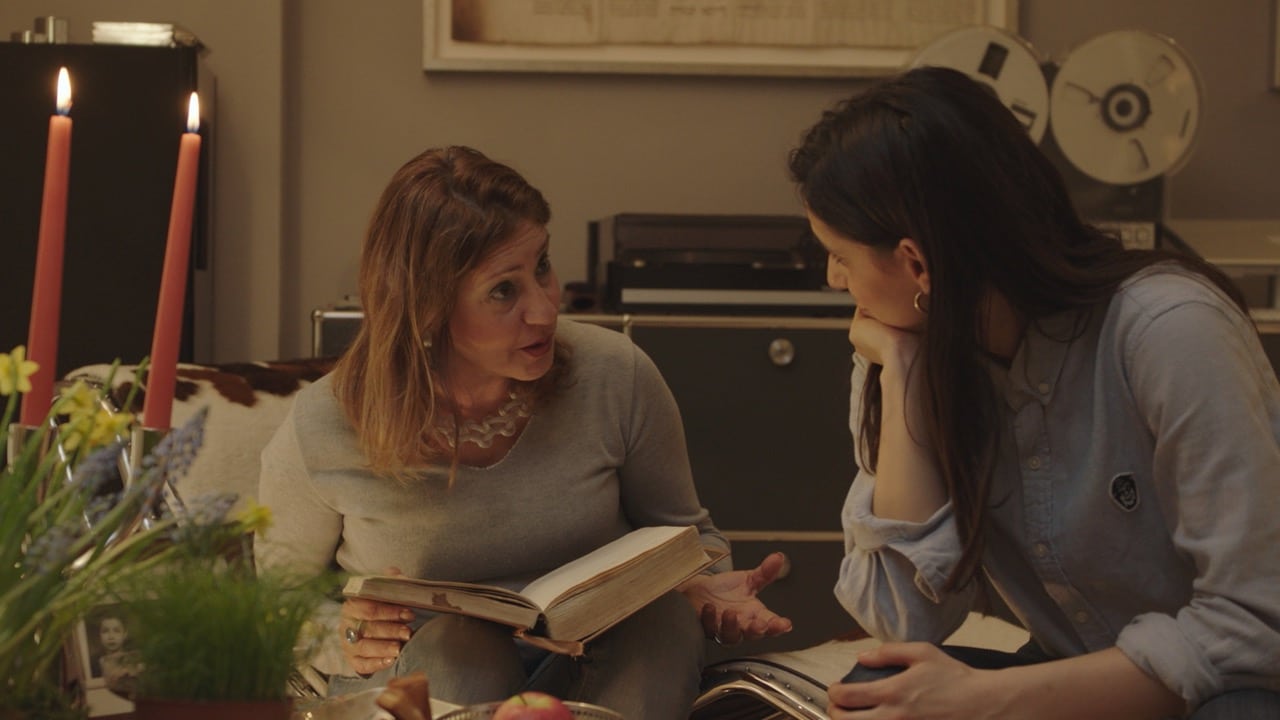
Born in Evin
Filmmaker Maryam Zaree explores the harrowing history of her birth in the cells of Evin, Iran’s notorious torture prison, created shortly after the nation became the Islamic Republic. Thousands of everyday citizens were executed and caged in cells, including the hundreds of women who were forced to give birth there.
Zaree spends the bulk of the film sifting through her mother’s past, who understandably doesn’t wish to speak of the horrors she witnessed. It’s an achingly beautiful film that deals with the trauma shared between mother and daughter, but also with the responsibility Zaree feels to her mother and countless other women stories of these other women with similar experiences is profound and anchors or the wider narrative.
Born in Elvin asks whether or not the truth is worth pursuing if the answers could potentially destroy the community you love. By the end of the film we’re not given definitive answers, but nor should we expect them. Born in Elvin makes it very clear that Life doesn’t work in shades of black and white, but murky greys
Butterfly
For Irma Testa, boxing is all she’s ever known. It was her golden ticket to a better future than the one she knew in the crime-ridden neighbourhood in Naples, Italy. But what happens when a dream – the thing you’ve bet your entire life on, doesn’t work out?
In Butterfly, writer-directors Alessandro Cassigoli & Casey Kauffman explore this question, and what it means to create after the thing you love comes crashing to the ground. Butterfly is a beautiful film that explores the broken pieces of a dream that was never achieved, and the process of moving towards a new dream and a new identity.
Irma is tough because she’s had to be, resilient because while her single mother provided everything she could, she still had to fend for herself. And when her boxing career takes a turn for the worse at the Olympics in Rio de Janeiro, Irma is forced to face the inevitable she’d be fighting off for years.
Beautifully shot by cinematographer Giuseppe Maio, Butterfly pulls no punches, pardon the pun. The camera moves with Irma through the media attention that comes with being Italy’s first female boxer to make it to the Olympics, as well as the pain of defeat.
For female sports lovers, Butterfly is a must-see at Hot Docs 2019.
Inside Lehman Brothers
Most of the people who blew the whistle about the shady and illegal tactics of the Lehman Brothers were women. Inside Lehman Brothers follows their stories as they look back on the fiasco that was the 2008 financial crisis; how it affected them personally and how the actions of a few destroyed the lives of hundreds of millions of people.
In 76 minutes, director Jennifer Deschamps takes us from the innocence of people following orders to the sheer sadness on their faces when recounting what they dealt with: Extortion, sexual assault and more.
It got to the point where Sylvia Vega-Sutfin—one of the subjects of the film—was so afraid for her life that she “taught herself to take a human life with her bare hands.”
Short but powerful, Inside Lehman Brothers, tells us a very human story from a unique perspective ultimately showing the consequences the truth has on people and women of colour.
Merata: How Mum Decolonised the Screen
When Maori filmmaker and activist Merata Mita passed away suddenly in 2010 the film world stopped and reflected upon her decades-long career. In Merata: How Mum Decolonised the Screen, her son Hepi pours over her life’s work, and his relationship with it through her personal archives.
Merata: How Mum Decolonised the Screen weaves in her motherhood through various audio logs Hepi discovers, and juxtapose it with her filmmaking and activist career lovingly explored through people who knew her and were inspired by her.
We see how, after being turned away by a studio system that shunned anything other than the white, male perspective, Merata struck out on her own to create the films that give credence to stories shared by her community.
From Taika Waititi to Alanis Obomsawin, Merata is a stunning work that beautifully honours the female filmmakers lasting impact and legacy.

